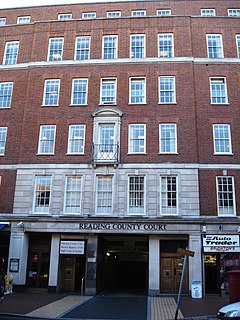This aims to be a complete list of the articles on real estate.

Renting, also known as hiring or letting, is an agreement where a payment is made for the temporary use of a good, service or property owned by another. A gross lease is when the tenant pays a flat rental amount and the landlord pays for all property charges regularly incurred by the ownership. An example of renting is equipment rental. Renting can be an example of the sharing economy.

A landlord is the owner of a house, apartment, condominium, land, or real estate which is rented or leased to an individual or business, who is called a tenant. When a juristic person is in this position, the term landlord is used. Other terms include lessor and owner. The term landlady may be used for the female owners. The manager of a pub in the United Kingdom, strictly speaking a licensed victualler, is referred to as the landlord/landlady.

Eviction is the removal of a tenant from rental property by the landlord. In some jurisdictions it may also involve the removal of persons from premises that were foreclosed by a mortgagee.

A lease is a contractual arrangement calling for the user to pay the owner for use of an asset. Property, buildings and vehicles are common assets that are leased. Industrial or business equipment is also leased. Broadly put, a lease agreement is a contract between two parties: the lessor and the lessee. The lessor is the legal owner of the asset, while the lessee obtains the right to use the asset in return for regular rental payments. The lessee also agrees to abide by various conditions regarding their use of the property or equipment. For example, a person leasing a car may agree to the condition that the car will only be used for personal use.
A leasehold estate is an ownership of a temporary right to hold land or property in which a lessee or a tenant holds rights of real property by some form of title from a lessor or landlord. Although a tenant does hold rights to real property, a leasehold estate is typically considered personal property.
A rental agreement is a contract of rental, usually written, between the owner of a property and a renter who desires to have temporary possession of the property; it is distinguished from a lease, which is more typically for a fixed term. As a minimum, the agreement identifies the parties, the property, the term of the rental, and the amount of rent for the term. The owner of the property may be referred to as the lessor and the renter as the lessee.
Buy-to-let is a British phrase referring to the purchase of a property specifically to let out, that is to rent it out. A buy-to-let mortgage is a mortgage loan specifically designed for this purpose. Buy-to-let properties are usually residential but the term also encompasses student property investments and hotel room investments.

A house in multiple occupation (HMO), or a house of multiple occupancy, is a British English term which refers to residential properties where ‘common areas’ exist and are shared by more than one household.
Landlord harassment is the willing creation, by a landlord or their agents, of conditions that are uncomfortable for one or more tenants in order to induce willing abandonment of a rental contract. This kind of activity is common in regions where rent control laws do exist, but which do not allow the direct extension of rent-controlled prices from one tenancy to the subsequent tenancy, thus allowing landlords to set higher prices. Landlord harassment carries specific legal penalties in some jurisdictions, but enforcement can be very difficult or even impossible in many circumstances.
Leaseback, short for "sale-and-leaseback", is a financial transaction in which one sells an asset and leases it back for the long term; therefore, one continues to be able to use the asset but no longer owns it. The transaction is generally done for fixed assets, notably real estate, as well as for durable and capital goods such as airplanes and trains. The concept can also be applied by national governments to territorial assets; prior to the Falklands War, the government of the United Kingdom proposed a leaseback arrangement whereby the Falklands Islands would be transferred to Argentina, with a 99-year leaseback period, and a similar arrangement, also for 99 years, had been in place prior to the handover of Hong Kong to mainland China. Leaseback arrangements are usually employed because they confer financing, accounting or taxation benefits.
CitiApartments was one of the largest real estate companies in San Francisco, California, which at its peak owned and managed more than 300 buildings directly and through a number of affiliates. In recent years the companies suffered a financial downturn, and have been the subject of intense criticism and litigation for allegedly illegal business practices as a residential landlord.

An assured tenancy is a legal category of residential tenancy to an individual in English land law. Statute affords a tenant under an assured tenancy a degree of security of tenure. A tenant under an assured tenancy may not be evicted without a reasonable ground in the Housing Act 1988 and, where periodic changes in rent are potentially subject to a challenge before a rent assessment committee.

A foreclosure rescue scheme is a scam that targets those whose house is facing potential foreclosure. The scheme preys on desperate homeowners whose mortgages are in default by offering to prevent the foreclosure. There are various ways in which foreclosure rescue schemes work, causing different types of harm to the homeowners, but all ultimately with the likely end result of the owner being forced out of his/her home and losing even more money.
The Ellis Act is a 1985 California state law that allows landlords to evict residential tenants to "go out of the rental business" in spite of desires by local governments to compel them to continue providing rental housing.
The history of rent control in England and Wales is a part of English land law concerning the development of rent regulation in England and Wales. Controlling the prices that landlords could make their tenants pay formed the main element of rent regulation, and was in place from 1915 until its abolition by the Housing Act 1988.
Rent control in Scotland is based upon the statutory codes relating to private sector residential tenancies. Although not strictly within the private sector, tenancies granted by housing associations, etc., are dealt with as far as is appropriate in this context. Controlling prices, along with security of tenure and oversight by an independent regulator or the courts, is a part of rent regulation.
A sitting tenant is a tenant already in occupation of premises, especially when there is a change of owner. Sitting tenants can result from a decision not to evict an assured shorthold tenant following a change of owner or where there is a protected tenancy. Where a landlord sells a property but decides not to evict a tenant the new landlord is said to 'step in the shoes' of the old landlord and the terms of the tenancy continue.
Rent regulation in England and Wales is the part of English land law that creates rights and obligations for tenants and landlords. The main areas of regulation concern,
The Costa–Hawkins Rental Housing Act ("Costa–Hawkins") is a California state law, enacted in 1995, which places limits on municipal rent control ordinances. Costa–Hawkins preempts the field in two major ways. First, it prohibits cities from establishing rent control over certain kinds of residential units, e.g., single-family dwellings and condominiums, and newly constructed apartment units; these are deemed exempt. Second, it prohibits "vacancy control", also called "strict" rent control. The legislation was sponsored by Democratic Senator Jim Costa and Republican Assemblymember Phil Hawkins.






